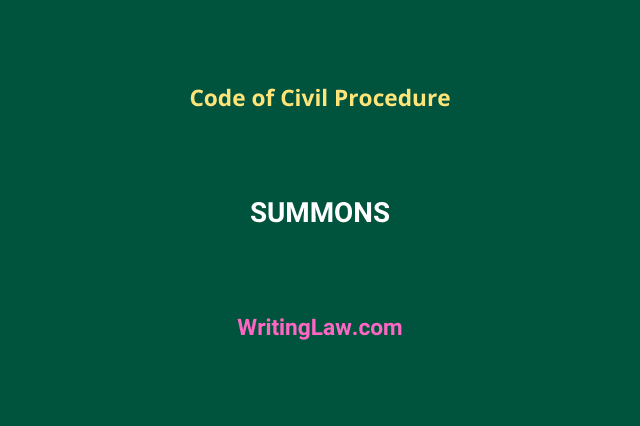
To follow the principle of natural justice, when a plaintiff files a lawsuit, the defendant must be notified that a lawsuit has been filed against him and that he must appear in court to defend himself.
The word “summons” has not been defined in the Civil Procedure Code. The intimation sent to the defendant by the court is known as a summons. Order 5 and sections 27 to 29 of the Civil Procedure Code deal with summons under civil litigation.
Related: Summons Under CrPC
Object of Issuing Summons
The object of issuing summons is to uphold the idea of natural justice and provide the defendant with the opportunity to say what he has to say against the prayer made by the plaintiff.
Essentials of Summons
According to Rule 1 and Rule 2 of Order 5 of the Civil Procedure Code, every summons shall be signed by the judge or the officer appointed by the court and shall bear the seal of the court. A plaint must accompany every summons.
Contents of Summons
According to Rule 5 of Order 5 of the Civil Procedure Code, the summons must state whether the date specified is for the settlement of issues only or for the final disposition of the suit. The summons should also include an order requiring the defendant to produce any documents or copies of documents in his possession or control that he intends to rely on in support of his case.
Service of Summons
The Civil Procedure Code specifies five methods for serving a summons on a defendant. They are:
Let us learn more about these methods of serving summons.
1. Personal or Direct Service
The summons must be served on the defendant in person or by an authorised representative wherever possible. If the defendant is absent from his residence at the time of service of summons, the summons may be served on any adult member or female member of the defendant’s family. A servant cannot be said to be a family member.
Where there are two or more defendants, the summons should be served on each defendant.
The service of the summons should be made by delivering a copy of the summons. After that, the serving officer must make an endorsement on the original summons regarding the delivery of the summons.
2. Service by Court
When a defendant is residing within the court’s jurisdiction, the summons shall be served through the court officer or any approved courier service. Where the defendant is residing outside the court’s jurisdiction, the summons will be served through an officer of the court within whose jurisdiction such defendant resides.
3. Service by Plaintiff
In addition to the service of summons by the court, the court may allow the plaintiff to serve the summons.
4. Substituted Service
Substituted service can be done in the following circumstances:
- If the defendant or his agent refuses to sign the acknowledgement, or if the serving officer is unable to locate the defendant after due diligence and there appears to be no chance of finding him, the service of summons can be done by fixing a copy of the summons on the outer door or some conspicuous (noticeable) part of the house in which the defendant resides or carries on business or personally works for gain.
- Where the court is satisfied that the defendant is avoiding service of summons or the summons cannot be served on the defendant in an ordinary way, the service may be achieved either by affixing a copy of the summons in the conspicuous place in the courthouse and also where the defendant last resided, carried on a business, or where he personally worked for gain or in such manner as the court thinks fit.
In Basant Singh vs Roman Catholic Mission (2002), the court stated that one must remember that this is not a regular mode of service. Hence it should not normally be allowed and should only be used as the last resort.
5. Service by Post
When the court receives an acknowledgement purporting to be signed by the defendant or his agent, or when the defendant or his agent refuses to accept delivery of the summons when it is tendered to him, the court issuing the summons shall declare that the summons had been properly served.
Read Next:
1. Trial of Summons Cases Explained – CrPC
2. When and Why Is a Legal Notice Mandatory
3. Differences Between Summon and Warrant
- What Is a Foreign Judgement and When It’s Not Binding in India - 26th July 2022
- What Are Second Appeals Under Civil Law - 23rd June 2022
- Civil Appeal as Per the Civil Procedure Code - 12th June 2022







